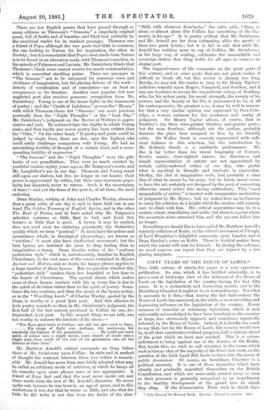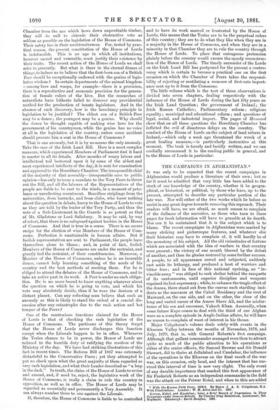FIFTY YEARS OF THE HOUSE OF LORDS.* Tins little volume
of ninety-five pages is a very opportune publication. Its aim, which it has fulfilled admirably, is to give a sort of bird's-eye view of the influence of the House of Lords on the legislation of the country during the last fifty years. It is a melancholy and depressing record ; and to the Hereditary Chamber it ought to be an instructive one. For what it amounts to is this,—that during the last half-century the House of Lords has exercised, on the whole, a most retarding and depressing influence on the legislation of the country. Every measure of remedial or reforming legislation, which is now universally acknowledged to have been beneficial to the country at large, was strenuously opposed, and sometimes repeatedly defeated, by the House of Lords. Indeed, it is hardly too much to say that, but for the House of Lords, the country would now be, in all that constitutes civilised progress, half a century ahead of the point which we have now reached. This is a serious indictment to bring against one of the Estates of the Realm. But, beside this, we wish to call attention to the issues which such action as that of the majority of the Peers last week, on the question of the Irish Land Bill, tends to force into the arena of public discussion. Of course, an hereditary Chamber is a political anomaly. It is one of those anomalies which have silently and gradually engrafted themselves on the British Constitution, and which are necessarily pruned away so soon as their presence is generally recognised as an impediment to the healthy development of the grand tree to which they cling. If the Conservative Peers wish to shield their
Fifty Years of the HOWIE of Lords. London : Macmillan and Co. 1891.
Chamber from the axe which hews down unprofitable timber, they will do well to obtrude their obstructive veto as seldom as possible on the legislation of the House of Commons. Their safety lies in their unobtrusiveness. For, tested by prac- tical reason, the present constitution of the House of Lords is indefensible. This is an age in which all institutions, however sacred and venerable, must justify their existence by their fruits. The recent action of the House of Lords we shall refer to presently. But what is there in the eternal fitness of things, to induce us to believe that the first-born son of a British Peer should be exceptionally endowed with the genius of legis- lative wisdom ? In certain departments of the animal kingdom —among bees and wasps, for example—there is a, provision, there is a reproductive and economic provision for the genera- tion of female rulers of the hive. But the researches of naturalists have hitherto failed to discover any providential method for the production of innate legislators. And in the absence of such discovery, how is the hereditary principle in legislation to be justified ? The eldest son of a British Peer may be a dunce ; the youngest may be a genius. Why should the dunce be thought capable of making wise laws for the government of his countrymen, while the genius has no voice at all in the legislation of the country, unless some accident should procure him a seat in the House of Commons ?
That is one anomaly, but it is by no means the only anomaly. Take the case of the Irish Land Bill. Here is a most complex measure, which experienced Members of Parliament find it hard to master in all its details. After months of weary labour and intellectual toil bestowed upon it by some of the ablest and most experienced intellects of the day, it is sent for examination and approval to the Hereditary Chamber. The irresponsible chief of the majority of that assembly—irresponsible save to public opinion—has only to issue a mandate to the Tory Peers to throw out the Bill, and all the labours of the Representatives of the people are liable to be cast to the winds, in a moment of petu- lance or unreflecting resentment. Beardless striplings from the universities, from barracks, and from clubs, who know nothing about the question in debate, hurry to the House of Lords to vote as they are told by the leader of the Tory Party, and thus the vote of a Sub-Lieutenant in the Guards is as potent as that of Mr. Gladstone or Lord Salisbury. It may be said, by way of retort, that there is no safeguard against boobies in the House of Commons. And that is true in a sense. There is no secure recipe for the election of wise Members of the House of Com- mons. Perfection is unattainable in human affairs. But if foolish representatives are sent to Parliament, the people have themselves alone to blame ; and, in point of fact, foolish Members of the House of Commons are under the restraint, and greatly feel the restraint, of their constituencies. Moreover, a Member of the House of Commons, unless he is an incurable dunce, cannot help learning something of the needs of his country and the best methods of meeting them. For be is obliged to attend the debates of the House of Commons, and to take an active part in its work. A Peer is under no such obliga- tion. He is no more bound to know anything whatever about the question on which he is going to vote, and which his vote may absolutely decide, than if he were the denizen of a distant planet. Can any reflecting man believe that such an anomaly as this is likely to stand the ordeal of a crucial dis- cussion after any catastrophe due to the rash action and hot temper of the Peers ?
One of the meritorious functions claimed for the House of Lords is that of checking the rash legislation of the House of Commons. The partisans of this theory forget that the House of Lords never discharges this function except when the Liberals happen to be in office. Whenever the Tories chance to be in power, the House of Lords are reduced to the humble duty of ratifying the resolves of the Ministry of the day. We have had striking illustrations of this fact in recent times. The Reform Bill of 1867 was extremely distasteful to the Conservative Peers ; yet they attempted to put no check upon what the great majority of them regarded as very rash legislation, and what their Leader described as "a leap in the dark." In truth, the claim of the House of Lords to revise and amend, and, if need be, reject, the legislative work of the House of Commons, is really a claim to rule the country in opposition, as well as in office. The House of Lords may be regarded as essentially and permanently a Tory Assembly. It can always number three to one against the Liberals.
If, therefore, the House of Commons is liable to be controlled and to have its work marred or frustrated by the House of Lords, this means that the Tories are to be the perpetual rulers of this country ; they are to do what they like when they are in a majority in the House of Commons, and when they are in a minority in that Chamber they are to rule the country through the House of Lords. To place that outrageous pretension plainly before the country would ensure the speedy reconstruc- tion of the House of Lords. The timely surrender of the Lords on the Irish Land Bill has postponed for the present a contro- versy which is certain to become a practical one on the first occasion on which the Chamber of Peers takes the responsi- bility of rejecting or mutilating a measure of first-rate import- ance sent up to it from the Commons.
The little volume which is the text of these observations is divided into seven chapters, dealing respectively with the influence of the House of Lords during the last fifty years on the Irish Land Question ; the government of Ireland ; the Irish Roman Catholics ; Parliamentary reform ; religious equality ; municipal and educational reform ; and questions of legal, social, and industrial import. The pages of Hansard show that on all these questions the Hereditary Chamber has inflicted the evil of disastrous delays on the country. The conduct of the House of Lords on the subject of land reform in Ireland,—which only a week ago threatened the wreck of a great healing measure,—is particularly . instructive at this moment. The book is tersely and lucidly written, and we can cordially recommend it to the reading public in general, and to the House of Lords in particular.































 Previous page
Previous page